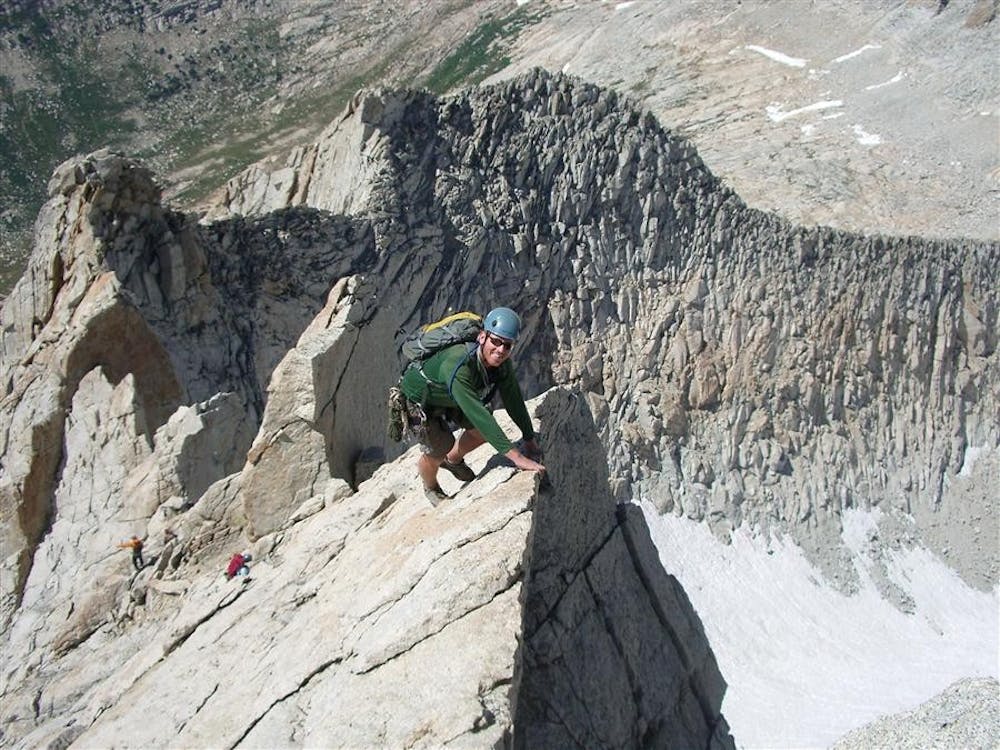Curt Davidson is a contradiction: a mountaineer living in Bloomington. Davidson graduated from IU in 2006, and now he’s back working on his master’s in outdoor recreation adventure education. While he knows how to survive a plane crash in a jungle or days adrift at sea, his specialty is surviving on the top of the world in some of the most desolate places on Earth.
You’re a mountaineer based in Bloomington. How does that work out for you?
Bloomington is something like 800 feet above sea level. But the Red River Gorge in Kentucky offers some world-class climbing. Every other week, a group of us go for a visit. Not gonna lie though, sometimes it’s hard to turn the truck back around to Bloomington.
What’s the highest mountain you’ve climbed, successfully or unsuccessfully?
I have successfully climbed Mount Whitney in California, which is the highest point in the lower 48 states. Unsuccessfully, Cayambe in Ecuador. It’s about 19,000 feet high, but I got sick from the altitude before I reached the top. Cayambe is an extinct volcano, and there was a point when the smell of sulfur was really strong, and I lost all my breakfast. Extreme cases of altitude sickness can create water on the heart or brain. There is no cure except to get out of there.
So you have to worry about altitude sickness, but what about avalanches?
You walk in the night. Climbers normally wake up at midnight and start hiking at 1 a.m. During the day, the snow melts, but by midnight it has usually frozen and it’s firm again. You’re less likely to experience avalanches if you walk in the night.
What about skills that would help you live in the wilderness?
I mean, learning to purify water is important, but the will to survive is essential. Outward Bound programs at IU try to build resolve and help people handle stress.
You worked for the Forest Service in California, which means you spent a lot of time wandering alone in the backcountry in case hikers ran into trouble. What kind of training did you have to go through?
Becoming a medical-wilderness first responder is mandatory. You are taught how to keep someone alive long enough to get out of the backcountry. You also learn a lot of preventive measures. If you find yourself in a situation where you need to use your training, you’ve already done things really wrong. That guy in “127 Hours” who had to cut off his arm? He did a number of things wrong. First off, he didn’t tell anyone where he was going. Outdoor people are kind of mad at the guy because he was being a bonehead, and people see him as a kind of hero.
Have you ever been in a crisis situation while climbing?
I was with a three-day weekend course to teach students how to rock climb. A student fell 15 feet, landing face first. When I climbed down, there were pools of blood on the rock, and she had her hands over her nose. When I got her to move her hands, her nose was over her eye and there was a four-inch laceration. Her right nostril was ripped open. We wrapped her with gauze, but it never really stopped bleeding until we got to the hospital.
What is it about mountain climbing that you like so much?
The camaraderie, the experience of being with people striving for a common goal. The types of bonds and relationships formed are not like any other friendship I’ve ever had before. Second, a strange curiosity. I have a burning desire to know what is up there, to see the world from that peak, to feel the wind. Most mountaineers feel that way. You go to obscure places, deserts that no one else has been to or heard of. It’s peaceful. It’s the dead of night, with millions of stars and you only hear your breath, your ice pick and steps on firm snow.
Curt Davidson's 'Big Survival Rules'
1. If lost, stay put. It’s harder to hit a moving target.
2. Remember the rule of three. You can survive three minutes without oxygen, three days without water, three weeks without food, and three months without shelter.
3. Always keep a mirror handy. A reflective source would make it easier to find you.






